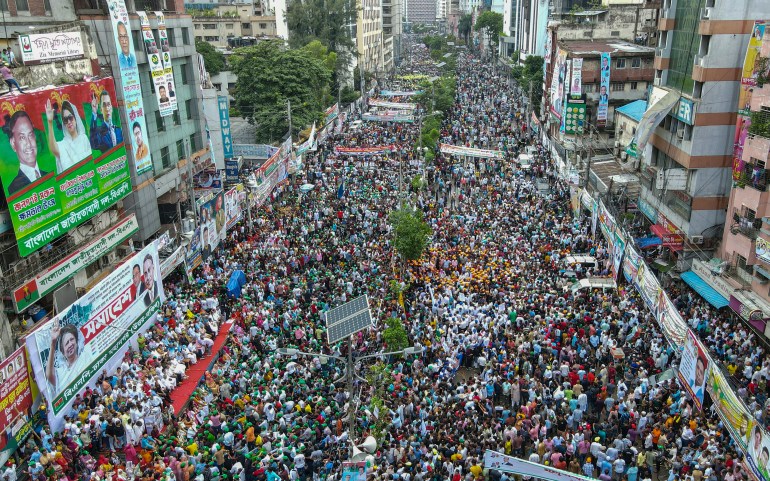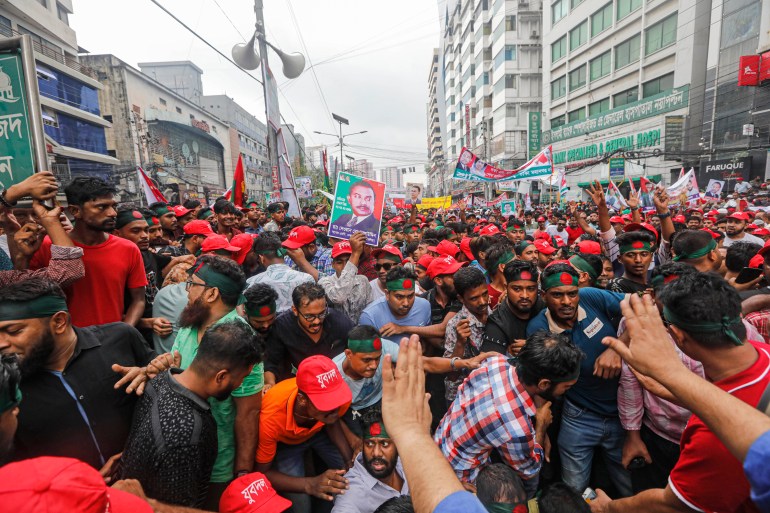Tens of thousands of opposition activists march in capital Dhaka and other cities asking PM Sheikh Hasina to quit before national polls.
At least one opposition activist has died and hundreds of others were injured in clashes across Bangladesh as tens of thousands demanded Prime Minister Sheikh Hasina’s removal ahead of elections expected in January.
Tens of thousands of opposition activists on Tuesday defied the scorching sun to march in capital Dhaka and other cities, calling for Hasina’s resignation.
Hasina’s Awami League has ruled the world’s eighth most populous country since 2009 and has been accused of human rights abuses and corruption.
The opposition Bangladesh Nationalist Party (BNP) led by former Prime Minister Khaleda Zia and dozens of smaller allies have called for protests throughout the country to demand Hasina step down and the polls take place under a neutral caretaker government.
Mirza Fakhrul Islam Alamgir, secretary general of the BNP, called upon the government to immediately step down, dissolve parliament and hand power to an interim administration to help restore democracy in the South Asian country.
In Dhaka, activists and supporters from different parts of the city joined the march that stretched for nearly 13km, bringing traffic at different points to a standstill for hours on a busy weekday.
The BNP said its marches came under attack in Dhaka and at least 16 other places on Tuesday.
“Sajib Hossain, one of our activists, was hacked and shot dead by members of student wing of the ruling party” in Laxmipur, BNP spokesman Zahir Uddin Swapan told the AFP news agency.
He accused police of opening fire with shotguns at hundreds of BNP supporters in the southern coastal district, leaving at least 200 people injured.

Joynal Abedin, a doctor at the state-run Laxmipur Sadar Hospital, confirmed one person was killed and at least 50 others were injured.
“We have to conduct post-mortem to know what caused the death,” he said.
A police inspector said they were not sure the death was a result of clashes between the opposition and the ruling party.
National police spokesman Monzur Rahman refused to comment on the nationwide violence.

Western governments have expressed concern over the political climate in Bangladesh, where Hasina’s party dominates the legislature.
Her security forces are accused of detaining tens of thousands of opposition activists, killing hundreds in extrajudicial encounters and disappearing hundreds of leaders and supporters.
The elite Rapid Action Battalion (RAB) security force and seven of its senior officers were sanctioned by Washington in 2021 in response to those alleged rights abuses.

The United States has called for a free and fair election and two senior State Department representatives met with local officials in Dhaka last week.
The BNP and its allies accuse Hasina’s party of rigging the two most recent elections in 2018 and 2014.
To counter the protests, the ruling party also planned a “peace and development” procession in Dhaka on Tuesday. At least 10 people were injured after BNP and Awami League supporters clashed in the southeastern district of Khagrachhari.
Last week, about 50,000 people attended a rally in Dhaka, which dispersed without incident. The BNP and other opposition groups have planned more rallies on Wednesday.
The next general election is due before the current parliament’s term expires in late January.


